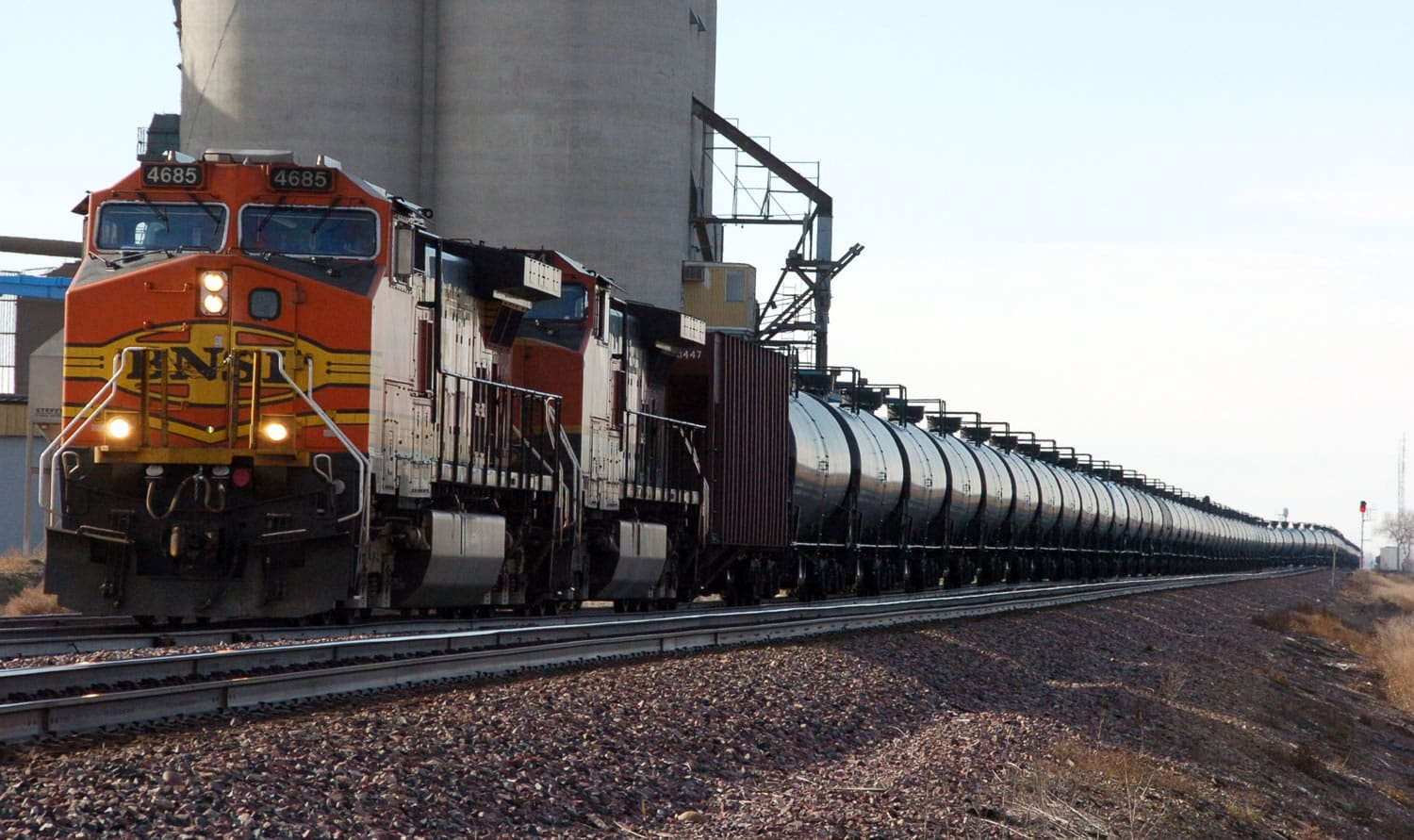BNSF Railway is investing millions of dollars in safety improvements on tracks and the purchase of new oil tanker cars, railroad officials told Clark County business leaders during an invitation-only meeting Tuesday. At the 90-minute session, the officials also promised to develop a more open relationship with the community as local residents debate a proposal for rail transport of oil to a transfer terminal at the Port of Vancouver.
BNSF’s pitch to about 55 members of the county’s top business organizations comes at a time of intense public scrutiny locally and across North America about the safety of transporting oil to market from North Dakota’s Bakken oil field. A series of rail accidents, most notably the rail derailment and explosion of a runaway oil train in Lac-Megantic, Quebec, in July that killed 47 people, has rattled public confidence in the safety of crude oil rail shipments.
The most recent manifestation of that anxiety came Tuesday with a Port of Portland statement that it will not pursue an oil-by-rail project, for now, because of environmental and safety concerns. The port said it has received numerous inquiries about its interest in siting facilities to handle U.S.- and Canadian-produced oil arriving by train.
“The port is interested in being part of an American energy renaissance brought on by this remarkable domestic oil transformation,” the port said in a written statement. “However, we do not believe that we have sufficient answers to the important questions regarding environmental and physical safety to proceed with any type of development at this time.”
The BNSF officials said regulations and safety procedures that have emerged since the Quebec rail disaster have further increased safety of an already safe mode of oil transport. They also said BNSF’s plan, announced last month, to purchase a fleet of up to 5,000 new crude oil tank cars with safety features that exceed industry standards, demonstrates the railroad’s emphasis on safety.
BNSF is currently seeking bids on those “new generation” cars, said Patrick Brady, the railroad’s assistant director of hazardous materials. The move is a bold one for BNSF, which now has a fleet of just 600 cars that it uses primarily for its own operations, Brady said.The railroad hasn’t decided whether it will maintain ownership or sell the new cars.
“This really is a game-changer,” he said. “We felt this was the only way to push the new generation cars.”
Clark County leaders are paying close attention to the issue because of a proposal by Tesoro Corp. and Savage Companies to build a $110 million oil terminal at the Port of Vancouver that would handle as much as 380,000 barrels of crude per day for eventual conversion into transportation fuels. The companies submitted their permit application Aug. 29.
An environmental impact review by the state Energy Facility Site Evaluation Council is expected to take longer than a year. Gov. Jay Inslee has the final say over whether the project gets built.
Key business groups
The railroad officials delivered their message to leaders of the Greater Vancouver Chamber of Commerce, Identity Clark County, and the Columbia River Economic Development Council in an afternoon invitation-only meeting at the Riverview Community Bank Center in east Vancouver. News media representatives were only informed of the meeting Tuesday morning. BNSF officials, who wanted to head off any possibility of protests by rail terminal opponents, had requested the short public notice to the news media, said Kelly Love Parker, the Greater Vancouver Chamber’s president and CEO.
Courtney Wallace, BNSF’s public affairs director for Northwest states and British Columbia in Canada, confirmed the railroad’s concerns about attracting opponents.
“We wanted to make sure the business community had an opportunity to ask their questions,” she said. Wallace said Tuesday’s meeting was part of BNSF’s move toward a more open relationship with local communities. Wallace noted that the railroad would present its safety report in an open forum during an April 14 Vancouver City Council public workshop.
“We have a 153-year history of ‘We are the railroad. We were here first,'” Wallace said. “We are trying to change that.” The railroad operates in 28 sates and two Canadian provinces, with 32,500 miles of track and 41,000 employees.
The local business leaders peppered the BNSF officials about expected train volumes if the oil transfer terminal is built; safety issues at open rail crossings; BNSF’s plans for increasing track capacity; the railroad’s plans for training emergency response workers and responding to emergencies; and who will foot the bill if a disaster occurs. The officials had some answers and said they had no information on other issues, including the potential increase in local rail traffic volumes.
Paul Montague, executive director of Identity Clark County, said after the meeting that his main concern with the Tesoro-Savage oil terminal proposal is how the increase in rail traffic will affect the county’s communities and Vancouver’s plans to redevelop its waterfront.
“The waterfront is a valuable community asset that we need to support,” Montague said.
Port of Portland concerns
The Port of Portland said in its statement that the North American oil boom brings many benefits, including eliminating dependence on foreign oil, reducing the U.S. trade imbalance and lowering energy input costs for steel and aluminum manufacturers.
However, the port said, the situation has raised concerns about the safe movement of crude by rail. There have been an estimated 10 derailments since 2008, the port said, and several recent events “involving transport of light Bakken crude oil in rail cars, which represent considerable cause for concern triggering a close examination of the transportation network.”
The port said its “interest will begin to grow once we have the confidence that transportation of crude oil by rail continues to meet all state, federal and local transportation rules and regulations and exhibits a sufficient accident-free record for a sustained period of time.”
Wallace said following the Vancouver session that BNSF shares the Port of Portland’s concerns about safety, which is why it is investing in new tank cars and technology to improve safety in operations. She said she is not aware of any consideration of an oil terminal at the Port of Portland.
Aaron Corvin contributed to this story.




